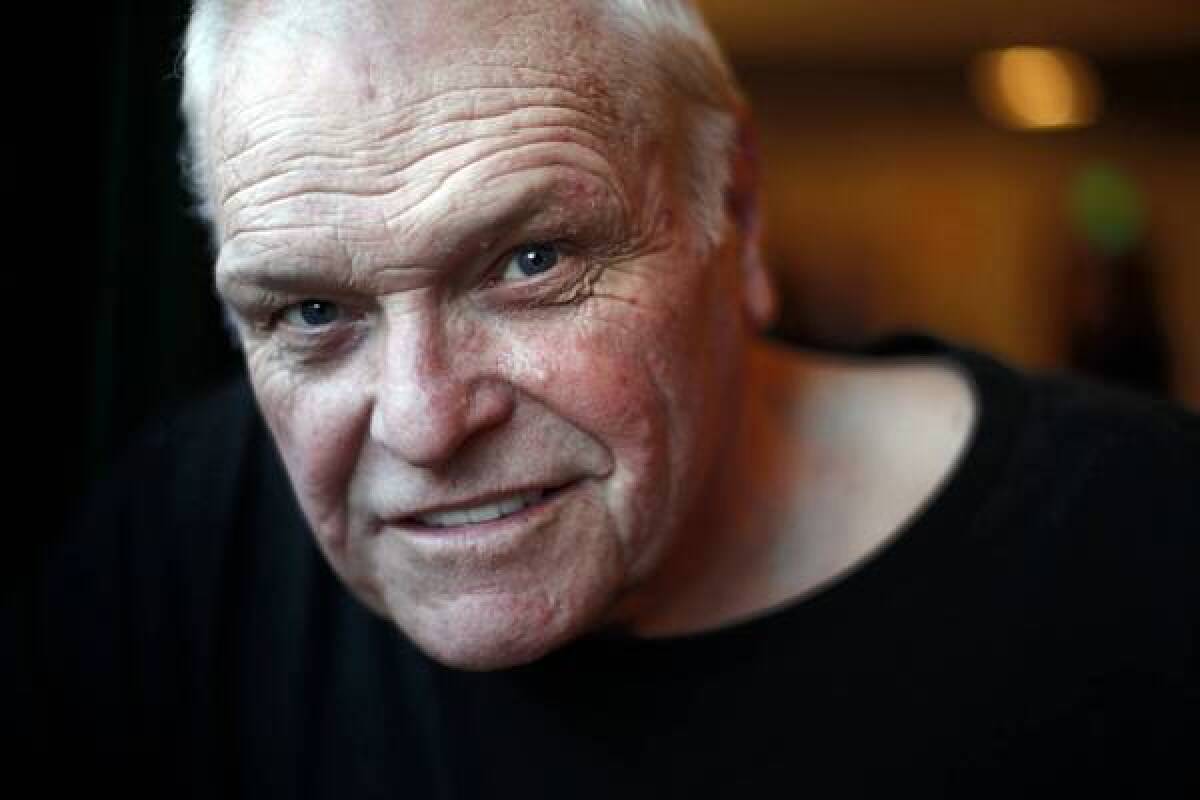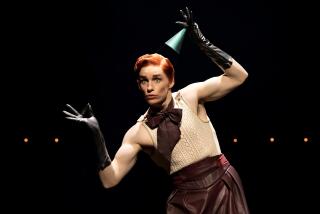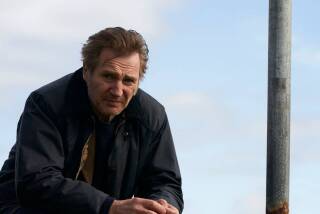Brian Dennehy: The big man’s biggest role

Brian Dennehy sat cross-legged on a stool and bent to rub his aching right knee and shin. His day of rehearsing “The Steward of Christendom” would soon be done.
But the physical nicks and dings that the former Columbia University football lineman and ex-Marine copes with at age 75 weren’t his main concern. He was more worried about getting his head around the part he’d handpicked for himself to play at the Mark Taper Forum, knowing full well that it’s a forbidding green monster.
Green because it’s Irish, Dennehy’s favorite flavor by birth. Monster because Sebastian Barry’s 1995 drama about the Irish Revolution of the early 1920s and its aftermath poses immense challenges of mood, memorization and storytelling. If they are not mastered, audiences are at risk of becoming lost amid the complexities of Irish history and the drifting of the protagonist’s senescent mind.
CHEAT SHEET: Fall arts preview 2013
“The logical question is, ‘What the hell are you doing this for?’ and I haven’t got an answer now,” was one of the first things out of Dennehy’s mouth after the rehearsal — the son of an Associated Press news editor making his interviewer’s job easy. “I’m probably too old for a challenge like this. But what the hell, why not? It’s a beautiful, beautiful play.”
“The Steward of Christendom” takes place mainly in the memory of Thomas Dunne, a former Dublin police superintendent relegated to a mental asylum. He struggles with loneliness, dementia and the lingering weight of national and family upheaval that fell on him during the violent birth of the Irish Republic.
The play is hardly ever staged, even though it made the original Thomas, Donal McCann, the toast of the English-speaking theater world. There has never been a major, or perhaps even an amateur, production in Southern California.
“One of the reasons is that the leading role is so damn difficult,” said director Steven Robman, reunited with Dennehy in a rehearsal room for the first time since 1985, when they worked on the last in a series of Irish-themed plays they’d tackled together in New York, L.A. and Chicago.
“It’s a huge load, even more of a load than King Lear, given what he’s charged with demonstrating. You wouldn’t do it unless you felt you had to,” Robman said. Dennehy will be onstage for all but a few moments of the two-hour, 15-minute play.
McCann vetoed a proposed 20-week run on Broadway in 1997, instead playing a shorter stand at the Brooklyn Academy of Music. “The starring role is so exhausting that not even McCann, who has the strength and stamina of a great athlete, could promise more than 12 weeks,” Newsweek reported.
PHOTOS: Hollywood stars on stage
Dennehy is committed to six weeks at the Taper, but he’s the same age Barry specifies for Thomas; McCann was in his early 50s.
What’s daunting, Dennehy said, is “the range of notes you’re going to be playing.” Inhabiting Thomas calls for humor, swagger, anguish and rage. Much of the part’s poignancy resides in quietly luminous moments of inward reconciliation the actor must outwardly project.
The character has 10 long monologues, three of them extending through two full pages of a tightly printed play script.
Barry, who based the story on his own great-grandfather (it’s one of many plays and novels he has mined from his family’s history), is allowing some small changes to help clarify historical nuances for Americans. The play is set in 1933 and looks back on events leading up to 1922, when Irish rebels ousted the British, then fell to fighting among themselves.
Dennehy’s past association with director Robman was pivotal. It brought him to the Chicago theater scene and introduced him to a crucial ally in Robert Falls, the Goodman Theatre artistic director who has cast Dennehy repeatedly in monumental roles there for more than 20 years.
From the late 1970s into the early 2000s, the actor’s size and craggy, strong-jawed looks made him a go-to guy for films and TV movies in need of a bulldog lawman or a menacing sociopath. Now he jokes that he’s reached an age when the pickings are much leaner, with Morgan Freeman monopolizing the good parts that do come up. “And so he should.”
In “The Challenger Disaster,” a new TV movie co-produced by the BBC and the Science Channel, Dennehy plays the chairman of the presidential commission investigating the 1986 space shuttle explosion, with William Hurt as the star expert witness, physicist Richard Feynman.
PHOTOS: Arts and culture in pictures by The Times
While screen roles have ebbed, Dennehy has become certified over the past 15 years as one of America’s elite stage actors. He won Tony Awards for best actor as Willy Loman in “Death of A Salesman,” (1999) and as James Tyrone opposite Vanessa Redgrave, Philip Seymour Hoffman and Robert Sean Leonard in “Long Day’s Journey Into Night” (2003), productions that began at the Goodman.
Since turning 70, Dennehy has performed demanding double-header evenings of Samuel Beckett’s “Krapp’s Last Tape” and Eugene O’Neill’s “Hughie,” and revisited O’Neill’s “The Iceman Cometh” in a celebrated, nearly five-hour production at the Goodman starring Nathan Lane. Having played the lead role of Hickey at the same theater in 1990, Dennehy switched off and became Lane’s main antagonist among a crew of dead-ender New York barflies and hookers.
He said he could have tackled “The Steward of Christendom” when he was younger, but turned it down when playwright Barry asked him to head up a revival. “I said, ‘Forget about it. I saw Donal’s performance.’”
Now he’s come to terms with acting in another star’s shadow — as he previously did in O’Neill roles that had belonged to another of his heroes, Jason Robards Jr.
“Donal McCann will always own this part, in my mind,” Dennehy said. “This is a salute to Donal and Sebastian Barry for this beautiful piece of work.”
After seeing “Iceman” last year in Chicago, Michael Ritchie, artistic director of the Taper’s parent company, Center Theatre Group, asked Dennehy to consider doing a show in L.A. Dennehy asked Robman to read “The Steward of Christendom,” then it was Ritchie’s turn to have a look. All agreed it was a play that never should have fallen through the cracks, and Dennehy’s return to the Taper after nearly 30 years was on.
CRITICS’ PICKS: What to watch, where to go, what to eat
He’d lived in L.A. through the 1980s while his screen career was taking off, doing Irish-themed shows at the Taper in 1980 and 1984. His last L.A. stage production was the post-Broadway tour of “Death of A Salesman,” which reached the Ahmanson Theatre in 2000.
Part of the appeal for Dennehy and Robman is how “Steward” contradicts and complicates common assumptions about Irishness and Irish history.
The usual take is that Irish Catholics of the early 1900s universally loathed being colonial subjects of the British. But Thomas Dunne is an Irish Catholic who worships the memory of Queen Victoria and loyally serves the crown. He’s a proudly devoted policeman who believes in order and security. For him, the queen and her empire stand for the lawful and civilized rule fundamental to any nation’s prosperity and peace.
In 1933, 11 years after the British pulled out, Thomas continues to pay the price for having been on the wrong side of history. An orderly at the mental asylum goads him verbally and raps him with a baton when Thomas becomes ornery enough to give him the excuse.
That part is being played by Dennehy’s Irish-born son-in-law, James Lancaster, in a role reversal from their first meeting in Chicago 28 years ago. Under Robman’s direction, Dennehy gave Lancaster the third degree as a Northern Irish police detective interrogating a young IRA bomber in Ron Hutchinson’s drama, “Rat in the Skull,” at Chicago’s Wisdom Bridge Theater. Falls was artistic director of the small company, soon to be given a much bigger playpen when he was hired to lead the Goodman.
Dennehy recalls having coffee with Falls during the “Rat in the Skull” run. “He laid out his ambitions. He said, ‘You’re a terrific actor, and you and I are going to do this, this and this,’” Dennehy said, accenting each “this” with a rap on the table in front of him. “I kind of looked at him and said, ‘OK, I don’t mind. Who’s going to pay for the coffee?’ I owe him more than I can say. We’ve had a long and complicated and hugely creative relationship, and I love him.”
PHOTOS: Celebrities by The Times
Dennehy lives in a rural part of his native Connecticut with his second wife; they have a son and a daughter who are in college, and Dennehy has three daughters from his first marriage, two of them actors, including Lancaster’s wife, Elizabeth. Instead of resting up for “Steward,” he spent March to mid-October playing at the Stratford Festival in Ontario, where he’s performed in three spring-to-fall seasons since 2008. He played Pozzo in Beckett’s “Waiting for Godot,” and a counselor to Queen Elizabeth in Friedrich Schiller’s “Mary Stuart.”
Dennehy looks forward to a good rest after “The Steward of Christendom.” But he’s game for a New York run with Lane in “Iceman,” if one should come about. And although he makes no claim to being an accomplished Shakespearean actor, there’s one tragedy he’s eager to tackle: “I’ll be a great Lear. Whether I say the words right or not, I know how to play that part, and maybe one of these days we’ll get to it.”
You won’t hear many stars boasting that they’ve got “King Lear” licked. Maybe the message is that when an actor’s up to his neck in “The Steward of Christendom,” anything else must seem like a breeze.
-------------------
‘The Steward of Christendom’
Where: Mark Taper Forum, 135 N. Grand Ave., Los Angeles
When: 8 p.m. Tuesdays to Fridays (no performances Dec. 24-25 and Jan. 1); 2:30 and 8 p.m. Saturdays; 1 and 6:30 p.m. Sundays; 8 p.m. Dec. 23 and Dec. 30. Ends Jan. 5.
Tickets: $20 to $70, subject to increases based on demand.
Info: (213) 628-2772, https://www.centertheatregroup.org.
More to Read
The biggest entertainment stories
Get our big stories about Hollywood, film, television, music, arts, culture and more right in your inbox as soon as they publish.
You may occasionally receive promotional content from the Los Angeles Times.







